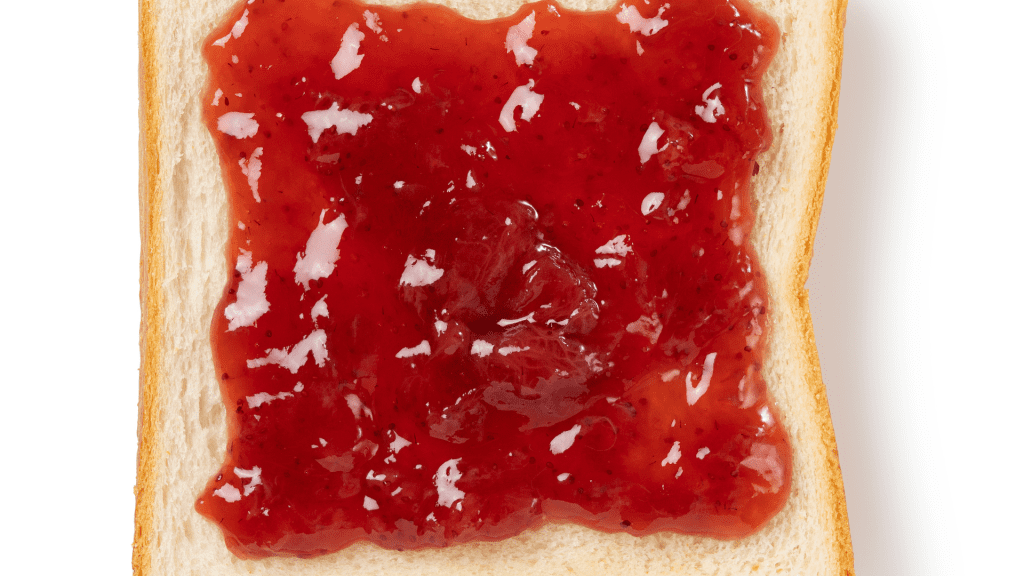Are you wondering if your cat can eat jelly? While it may seem harmless, jelly can actually be quite harmful to your feline friend. In this article, we’ll explore the question in depth and look at the positives and negatives of cats consuming this sweet treat.
Cats should not eat jelly as it is not a suitable food for them. Jelly is made from fruit juice and sugar, and while cats can eat small amounts of fruits, they cannot digest large amounts of sugar. Additionally, jelly often contains artificial ingredients and preservatives that can be harmful to cats.
Want to learn more about why jelly is not a good food option for your cat? Keep reading for more in-depth information.
A Little About Jelly
Jelly is a sweet spread made from fruit juice and sugar. It is also often thickened with pectin, a natural thickener derived from fruits, or other gelling agents. Some jellies also contain artificial ingredients and preservatives to maintain its texture and shelf life.

Nutritionally, jelly is relatively low in essential vitamins and minerals. However, it is a good source of carbohydrates, which provide the body with energy. The sugar content in jelly can vary depending on the type of jelly and the brand.
A typical serving size of 2 tablespoons of jelly contains around 50-60 calories and 13-15 grams of sugar. This is a relatively small serving size, but if eaten in large amounts, jelly can contribute to weight gain, blood sugar imbalances, and other health issues.
Can Cats Eat Jelly? The Truth
When it comes to jelly and cats, the answer is a bit tricky. While cats can technically eat jelly, it’s not something they really should eat. Jelly is typically made from fruit juice and sugar, and while cats can eat small amounts of fruits, they cannot digest large amounts of sugar. Additionally, jelly often contains artificial ingredients and preservatives that can be harmful to cats.
For example, imagine you and your cat are having a picnic and you offer them a scoop of strawberry jelly, thinking it’s a tasty treat. But little do you know, that scoop of jelly contains more sugar than a human should consume in a day. Not only that, but it also has artificial ingredients and preservatives that can upset their stomach and cause other health problems.
It’s also worth noting that while adult cats may be able to handle small amounts of jelly, kittens should not eat jelly at all. Their small bodies are not able to handle the sugar and artificial ingredients found in jelly. As they grow and mature, their digestive systems will become better equipped to handle small amounts of fruits, but until then, it’s best to stick to a diet of specially formulated kitten food.
In short, while cats can technically eat jelly, it’s not a suitable food option for them. The high sugar content, artificial ingredients and preservatives can cause negative health effects and it’s best to stick to specially formulated cat food and treats for your feline friend.
The Negatives of Cats Eating Jelly
So, you may be wondering, what exactly are the dangers of jelly for cats? Well, let’s take a closer look.
First off, the high sugar content in jelly can lead to some serious health problems for our feline friends. Just like with humans, too much sugar can lead to diabetes and obesity in cats. In fact, according to a study by the American Veterinary Medical Association, 56% of cats in the US are overweight or obese. And while jelly may seem like a small treat, it can quickly add up and contribute to these health issues.

Not only that, but jelly also often contains artificial ingredients and preservatives that can cause stomach upset and other digestive issues in cats. These artificial ingredients and preservatives can also be toxic to cats if consumed in large amounts.
And let’s not forget, jelly is not a natural food for cats. Cats are obligate carnivores, meaning they need a diet primarily made of meat and protein to thrive. Feeding them jelly is like feeding a lion a tofu burger, it’s just not going to cut it.
Alternatives To Jelly For Treating Your Cat
So, you may be thinking, if jelly isn’t a great idea for treating your feline, what can be some healthier options? Don’t worry, we’ve got you covered with a few alternative options
- Wet food: Wet food is a great alternative for cats as it’s high in protein and moisture, which is important for a cat’s overall health. Wet food also comes in a variety of flavors and textures, so you’re sure to find something your cat will love.
- Freeze-dried treats: Freeze-dried treats are a great option for cats as they are high in protein and low in carbohydrates. They also come in a variety of flavors, so you can find something your cat will enjoy.
- Homemade treats: You can also make your own cat treats at home. Some options include homemade tuna or chicken jerky, or a small piece of cooked meat.
When choosing treats for your cat, it’s important to check the ingredients and make sure they are suitable for cats. Avoid treats that contain high levels of sugar, artificial ingredients, and preservatives. It’s also important to keep in mind that treats should only be given in moderation, as they should not make up more than 10% of your cat’s diet.
Here are some treats we recommend.
As you can see, there are plenty of safe and healthy alternatives to jelly for treating your cat. By choosing the right treats and being mindful of the ingredients, you can ensure your feline friend stays happy and healthy.
FAQ
Is Jelly Toxic to Cats?
Consuming large amounts of jelly can be toxic to cats, as it can cause stomach upset, and other digestive issues, as well as negative effects on their overall health.
Can Kittens Eat Jelly?
No, kittens should not eat jelly. Their small bodies are not able to handle the sugar and artificial ingredients found in jelly.
How Much Treats Should I Give my Cat?
Treats should not make up more than 10% of your cat’s diet. It’s important to keep in mind that treats should be offered in moderation.
Can Cats Eat Any Type Of Jelly?
No, cats should not eat jelly made from fruit juice and sugar, as well as jelly that contains artificial ingredients and preservatives.
Final Thoughts
So, we’ve covered the question “Can cats eat jelly?” and have come to the conclusion that while cats can technically eat jelly, it’s not the best food option for them. Jelly is typically made from fruit juice and sugar, and while cats can eat small amounts of fruits, they cannot digest large amounts of sugar. Additionally, jelly often contains artificial ingredients and preservatives that can be harmful to cats.
We’ve also discussed some safe and healthy alternatives to jelly for treating your cat, as well as tips on how to choose the right treats and the importance of moderation.
We hope you found this article informative and fun, and we encourage you to share your own experiences or ask any additional questions you may have. Don’t forget to visit our website or follow us on social media for more information and updates on cat care and nutrition. And always remember, when in doubt, consult with your veterinarian.
